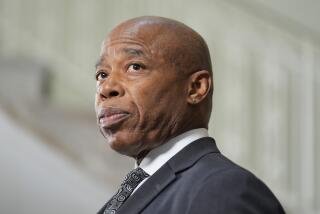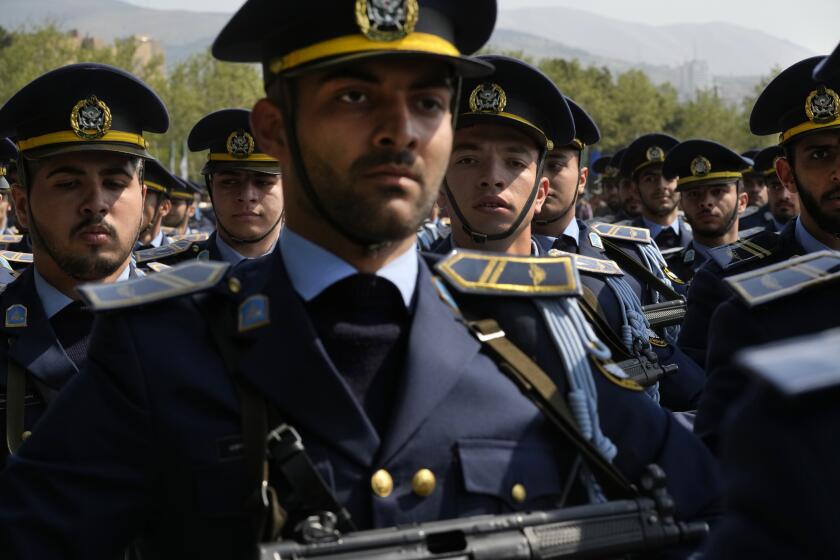Salvador Government Agrees Reluctantly to Accept 4,500 Refugees From Honduras
The government has agreed to receive 4,500 refugees who announced that they will return from Honduras today, but it will not permit U.S. religious workers and lawyers to enter the country with them, Foreign Minister Ricardo Acevedo Peralta said Friday.
Acevedo blamed the sudden, massive return of refugees on U.S. groups “intervening in the internal political affairs of El Salvador” and said that immigration officials at the Honduran border would not admit the Americans traveling with the refugees.
“This is a pressure to provoke an annoyance for the government. It is inappropriate,” Acevedo said.
He also charged that the Office of the U.N. High Commissioner for Refugees had failed to stop the massive exodus from its camp in Honduras and had been slow to give the government a plan for the refugees’ gradual return.
‘Politicized Masses’
The Salvadoran refugees have been living at Mesa Grande, a U.N.-sponsored camp near Honduras’ border with El Salvador.
U.S. and Salvadoran military officials say that the camp has been a rest and resupply area for guerrillas of the Farabundo Marti National Liberation Front. Military officials accuse the rebels of orchestrating the massive return of refugees, whom they describe as “highly politicized masses,” or guerrilla supporters.
The refugees are peasants from rural regions under sporadic control of the guerrillas and have said that they want to return to those areas, which still are considered war zones. Many of the refugees say they fled or survived army massacres in 1980 and 1981.
Acevedo denied that the government is concerned about the refugee’s political loyalties. Their return was good for the image of El Salvador, he said.
‘Progress Toward Democracy’
“The fact that these people are ready to come back to El Salvador, manipulated or not, says that they believe there is respect for human rights and progress toward democracy,” Acevedo said.
He said that the government will receive them as a demonstration of its will to comply with a Central American peace accord. The peace plan, signed by the presidents of Central America’s five nations Aug. 7, commits the governments to facilitate the return of refugees from the fighting.
Acevedo said, however, that the government would have trouble handling so many refugees at once and that the massive return had been “politically manipulated without scruples” by a U.S. coalition of church groups called Going Home.
The refugees are being accompanied from the camp by about 22 American priests, lawyers and church activists, members of a coalition formed last May to support the return of the Mesa Grande refugees.
Meddling Denied
Father Luis Olivares, pastor of La Placita Roman Catholic Church in Los Angeles and a member of the Going Home steering committee, denied the charge of intervention.
“We are there at the invitation of the refugees. We are not meddling,” he said in a telephone interview.
Among those accompanying the refugees are: Father Michael Kennedy, a representative of the Los Angeles Roman Catholic Archdiocese and the Rutilio Grande Pastoral Center for refugees; Evely Shlensky, representative of the American Union of Hebrew Congregations in Los Angeles, and Father Joe Nangle, representing the Conference of Major Superiors of Men in Washington.
The church activists say their work is spiritual, not political. Going Home spokeswoman Jean Stokan said in Washington that the refugees asked the Americans to travel with them into El Salvador to provide protection, moral and spiritual support, and to help with fund raising. She said the group has raised $40,000 for the returning families to buy seeds, farm equipment and materials to build new houses.
“The international delegation will accompany them as far as possible,” she said.
Expulsion of 23
In July, 1986, the Salvadoran government expelled 23 religious workers, including 19 Americans who escorted another group of returning refugees to their lands in a cooperative called El Barrillo, about 25 miles northeast of the capital near Guazapa Volcano, a longtime rebel stronghold.
El Barrillo and the resettlement expected today were organized by the National Repopulation Commission, a Salvadoran group that the government considers to be pro-guerrilla. Leaders of that commission say that one of the directors of the El Barrillo cooperative, Miguel Angel Lopez, was detained by soldiers last month and has since disappeared.
The Mesa Grande refugees have asked to return to five areas of Chalatenango, Cuzcatlan and Cabanas, all provinces with a heavy guerrilla presence. The government said that, initially, it intends to restrict the areas where the refugees may go.
Military officials have said that they do not want the civilians settled in the largely depopulated areas they have picked.
Accusations Foreseen
“The guerrilla presence increases where there is civilian population,” said Col. Mauricio Vargas, chief of operations for the Salvadoran army. “This will generate problems for our military operations. Later they will accuse us of assassinations and bombardments.”
The refugees had asked for assurances from the government that there will be no aerial bombing in the areas, no forced recruitment into the army and no civil defense units formed, but they have received no answer.
Vargas said the government will not be able to satisfy the basic needs of so many refugees, which will add to the government’s political problems.
Government officials had been negotiating a gradual return of refugees through a tripartite body of Honduran and Salvadoran officials and the Office of the U.N. High Commissioner for Refugees. Vargas said that the commissioner’s office was supposed to have identified the refugees and provided a logistical and assistance plan for their return but had been “complying slowly.”
Roberto Rodriguez, head of the U.N. mission in El Salvador, countered that the government, rather than the commissioner’s office, had been dragging its feet. He said that the refugees had advised the government by letters in January, March and June that they planned to return to this country and that they never received a response to a list of guarantees they sought.
In August, the refugees advised the government that they planned to return anyway this month, Rodriguez said.
More to Read
Sign up for Essential California
The most important California stories and recommendations in your inbox every morning.
You may occasionally receive promotional content from the Los Angeles Times.










